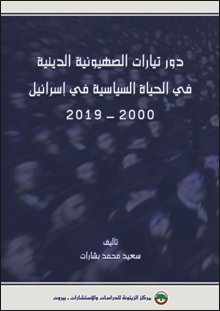Al-Zaytouna Centre for Studies and Consultations has published a new Arabic book by Said Bsharat, entitled, “The Role of Religious Zionism in the Israeli Politics 2000-2019,” which studies religious Zionism and its role in the socio-political transformations of the Israeli society. The 145-page is an Israeli studies master’s thesis conducted at Al-Quds University in 2019. Al-Zaytouna is offering the second chapter, “The Means of Religious Zionism to Ascend Within the State,” for free download.
Bsharat studies the influence of religious Zionism on the Israeli political life; its impact on the erosion of the Israeli system of government and its future; its rise and role in weakening the Israeli secular parties and haredim, and its influence on politics and decision-making at the expense of the secular trend, all during the 2000-2019 period.
The book is of three chapters in addition to the conclusions and recommendations.
| Click here to download Chapter Two: >> The Means of Religious Zionism to Ascend Within the State (Chapter 2)(Arabic) |
Chapter one defines religious Zionism and its religious and intellectual bases. It began in 1982, when senior rabbis and political leaders had put its basic principles. Many movements adopted it, but it remained on the margins and in the middle ranks until the Israeli disengagement from Gaza Strip in 2005, when many political and social changes occurred.
Chapter two explains how did religious Zionism ascend within the state. During the term of Benjamin Netanyahu (2015-2019), the religious Zionist movements have become prominent in dominant power positions. They have officers in elite combat brigades, one third of the judges of the Israeli Supreme Court and they hold key positions in the media. Also, religious Zionist leaders have emerged in the public service sectors, such as the legal advisor to the government, the police chief, head of the Mossad, in addition to the director of the prime minister’s office and the Israeli ambassador to the US. It is noted that religious Zionist movements have prepared their affiliates to become soldiers in the army, when in late 1980s they established pre-military biblical preparatory schools, consequently, the Israeli army has witnessed increase in the percentage of religious soldiers of national religious origins while the influence of secularism decreased.
Chapter three discusses the impact of the rise of religious Zionism to power. They obtained large ministerial portfolios, such as education and the judiciary, and the social assistance to religious schools and their students increased. As a result, they obtained more privileges and their institutional power increased beyond their social and political size. This has certainly affected the secular character of the state and the Israeli legal system. For example, when Ayelet Shaked became the Minister of Justice, she appointed 300 judges from this movement out of 800 judges, and 6 judges out of 15 to the Supreme Court, thus constituting 40% of the judges, which is a record number.
Due to its influence expansion, leftist and secular parties have adopted the positions of this movement, such as the Meretz party, which was not the only party that has shifted its convictions close to the right, whether in its ideological and political rhetoric or in trying to satisfy the settlers in the West Bank (WB). For the leftists, who were opposed to settlement building and settlement construction in WB, became supportive of keeping the settlements there. Hence the left movements became right, and the right ones became extreme right, as in Likud’s case.
The ascension of religious Zionist movement has accelerated the annexation of WB to Israel. For between 2011 and 2019, calls for the application of Israeli sovereignty over WB increased. In practice, annexing WB has already begun through formal legal and legislative steps, especially when the Israeli Knesset approved the “Law for the Regulation of Settlement in Judea and Samaria.”
At the end, Bsharat made several conclusions, among which the necessity to set a strategy that deals with developments that would liquidate the Palestine issue, for they are considered a major obstacle to any political progress.







 ||
||

Leave A Comment